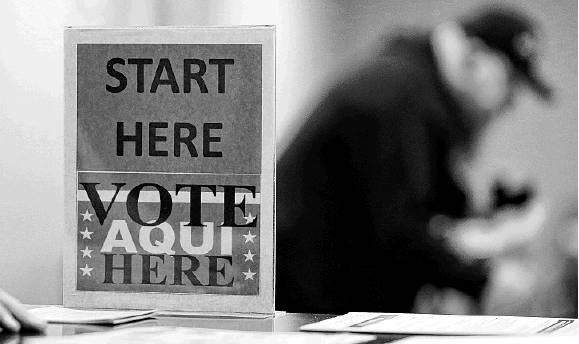SB9 is a bad idea
Poised to pass the state Senate, the measure makes it tougher to exercise voting rights.
Some folks in the Republican Party have given up. They are out of ideas, void of policy and lacking the enthusiasm needed to attract new voters. If demography is destiny, they seem to be content eking out marginal victories for a few more years by clinging to a dwindling base. How else do you explain their push to win elections through exclusion? Why else do they pin their hopes of power on disenfranchisement?
Their latest attempt, one of Texas Lt.Gov. Dan Patrick’s priorities for this year’s Legislature, is Senate Bill 9. While it contains a welcome measure to guarantee that all electronic voting machines can produce apaper record, it also includes provisions that put up obstacles targeting vulnerable populations.
SB9, poised to pass the Senate, makes it more difficult for people who need assistance at the polls, such as seniors and the disabled. It gives partisan poll watchers the right to be in the voting booth when a volunteer is helping someone, a clear encroachment on the secret ballot. It also imposes new hoops to jump through for election volunteers, including those who drive voters to the polls.
The most troubling provisions, though, are those that threaten jail time for certain election-related infractions — even in instances involving an honest mistake when registering.
The bill increases the penalty from a misdemeanor to a felony on certain election-related offenses, and removes the requirement for a court to consider intent. It also allows law enforcement to violate election law during an investigation or a prosecution, clearing the way for undercover sting operations that could have a chilling effect on legitimate voter registration efforts and potentially entrap the unwitting.
Though we may want to believe that no one would be prosecuted for unintentionally violating election laws, recent cases show that overzealous Texas officials should not be trusted.
Rosa Ortega, an legal immigrant with a sixth-grade education, was sentenced to eight years in prison for voting illegally in Tarrant County. This was a disproportionately harsh penalty for someone who mistakenly believed she could vote and who, as the facts of the case revealed, could have been informed of her ineligibility by the officials who accepted her registration. In another case, also in Tarrant County, Crystal Mason, a black woman, was sentenced to five years in prison for filling out a provisional ballot without knowing she was ineligible due to a felony conviction.
Officials have also shown a cavalier attitude when leveling unsubstantiated accusations. A clear example was the list of 95,000 registered voters that was handed over to the attorney general under claims these were immigrants ineligible to vote. The list quickly fell apart under scrutiny, and the investigation was put on hold, but only after it had been trumpeted by Republicans — including President Trump — as evidence of the GOP’s massive voter-fraud bogeyman.
Bills such as SB9 are voter suppression efforts, pure and simple. A way to intimidate the growing number of potential voters, including minorities and young people, that overall tend to support Democrats. That these attempts come under the guise of protecting the electoral process is particularly galling, since in-person, deliberate voter fraud is virtually nonexistent. When the restrictive 2011 Texas Voter ID law was taken to court, the judge noted that in the decade before the law was passed, there had been two convictions out of 20 million votes cast in the state.
Texas already ranks among the states with the lowest voter turnout, so participation by qualified voters should be made easier, not harder. Practical solutions include doing away with early registration deadlines and allowing online registration and address updates and automatic voter registration when obtaining a state ID. Those are the types of measures, widely endorsed by nonpartisan voter-rights organizations, that should take up lawmakers’ time.
Citizens have a fundamental right to vote, and the government must have a compelling reason if it wants to interfere with that right. SB 9 falls far short. Voter suppression efforts such as this one deserve our scorn, not the Legislature’s support.
